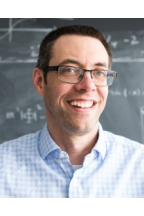Will Percival

Biography
Professor Percival's research interests focus on the properties of the Universe on the largest scales. Surveys of three-dimensional galaxy positions provide a wealth of data both on the physics just after the Big-Bang when the seed fluctuations that will grow through gravity to become galaxies were created, and on the physics driving the evolution of the Universe today.
Research Interests
Observational cosmology
Cosmological structure formation
Cosmological models
Large-Scale structure
Galaxy surveys
Galaxy formation & evolution
Astrophysics and Gravitation
Scholarly Research
Large international teams are required to undertake galaxy surveys, and Professor Percival helps to run a number of experiments. In particular, he holds the position of Survey Scientist in the on-going extended-Baryon Oscillation Spectroscopic Survey (eBOSS, www.sdss.org/surveys/eboss), and is a primary science coordinator for the future satellite mission Euclid (http://sci.esa.int/euclid). He is also working on the Dark Energy Spectroscopic Instrument (DESI, https://www.desi.lbl.gov/) and is involved in a number of other experiments and the use of their cosmological measurements.
Education
1999 PhD University of Oxford, Oxford, UK
Awards
Chinese Academy of Sciences "Distinguished Scientist'' fellowship 2016.
Co-recipient of the 2008 Royal Astronomical Society team award for the 2dF Galaxy Redshift Survey.
Royal Astronomical Society 2008 Fowler Prize awarded to “individuals who have made a note-worthy contribution at an early stage of their research career”.
2007 Philip Leverhulme Prize awarded to “outstanding scholars (normally under the age of 36) who have made a substantial and recognised contribution to their particular field of study”
Service
European Space Agency Astronomy Working Group (2013-2017).
UK Space Agency Space Programme Advisory Committee (2013-17).
UK STFC Astronomy Grants Panel (2013-15).
Isaac Newton Group of Telescopes Science Advisory Committee (2011-13).
Affiliations and Volunteer Work
Director, Waterloo Centre for Astrophysics
Teaching*
- PHYS 475 - Cosmology
- Taught in 2021, 2022, 2023, 2025
* Only courses taught in the past 5 years are displayed.
Selected/Recent Publications
W.J. Percival, (+26 co-authors), The 2dF Galaxy Redshift Survey: The power spectrum and the matter content of the universe, 2001, MNRAS, 327, 1297 [arXiv:0105252]
S. Cole, W.J. Percival, (+27 co-authors), The 2dF Galaxy Redshift Survey: power spectrum, 2005, MNRAS, 362, 505 [arXiv:0501174]
W.J. Percival, (+27 co-authors), Baryon Acoustic Oscillations in the Sloan Digital Sky Survey Data Release 7 Galaxy Sample, 2010, MNRAS, 401, 2148 [arXiv:0907.1660]
K.S. Dawson, J.-P. Kneib,W.J. Percival, (+142 co-authors), The SDSS-IV extended Baryon Oscillation Spectroscopic Survey: Overview and Early Data, 2016, AJ 151, 44 [arXiv:1508.04473]
D. Bianchi, W.J. Percival, Unbiased clustering estimation in the presence of missing observations, 2017, MNRAS 472, 1106 [arXiv:1703.02070]